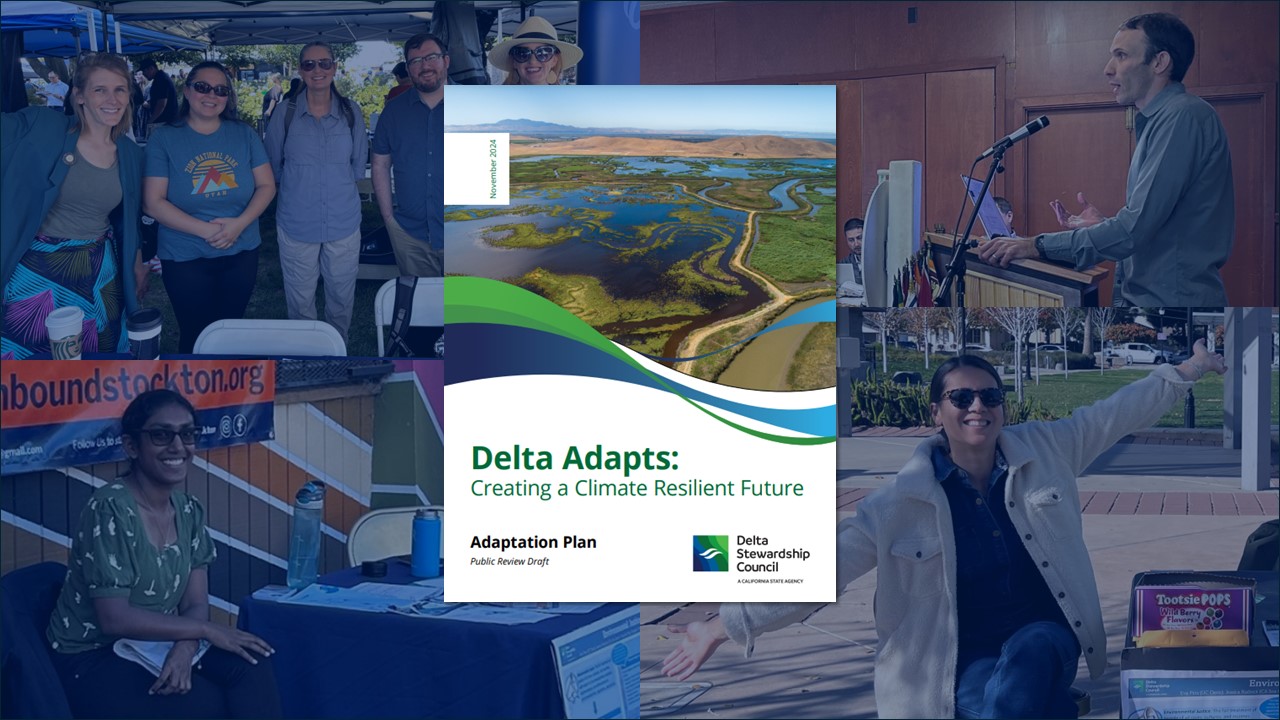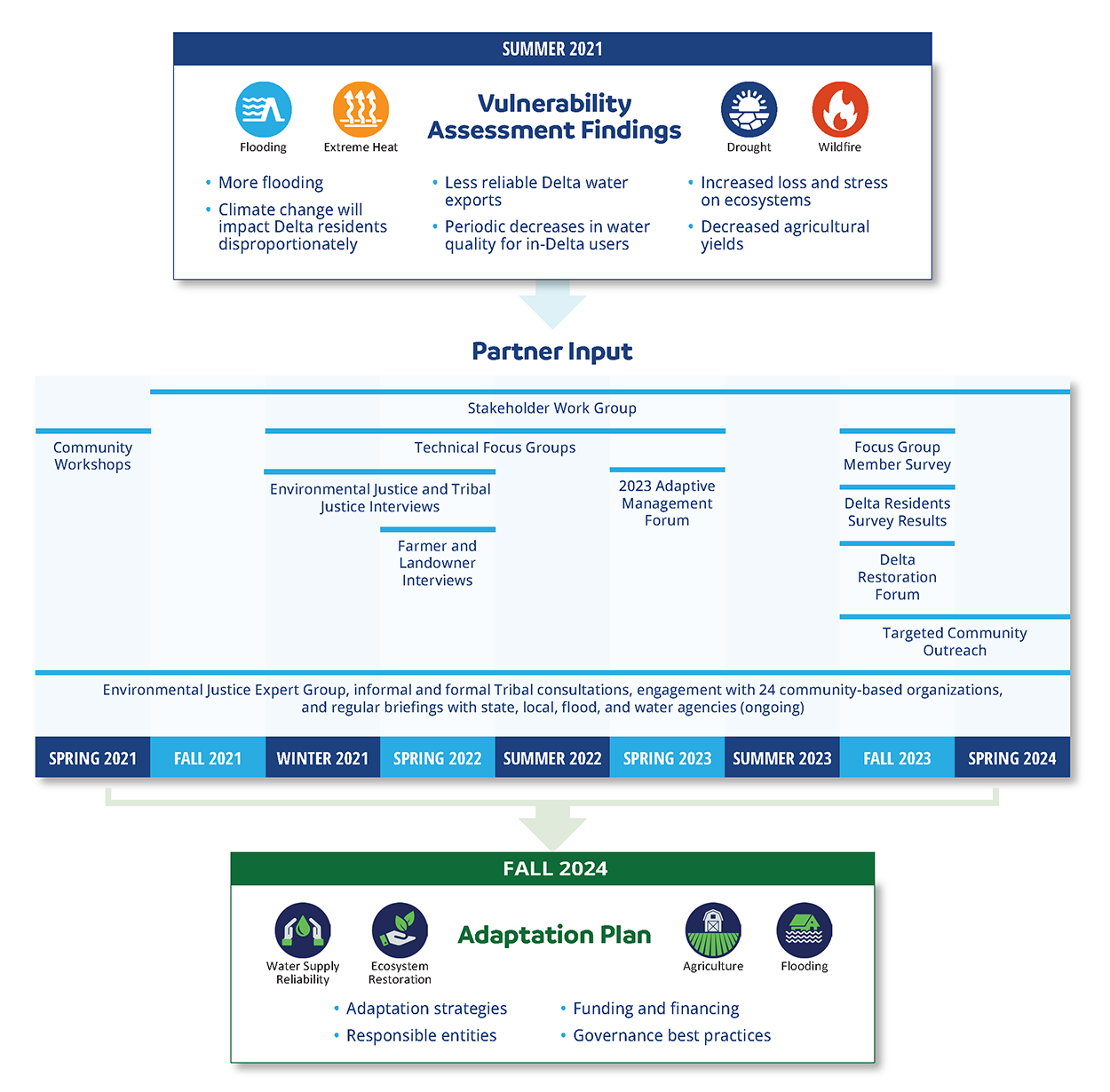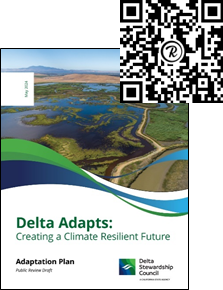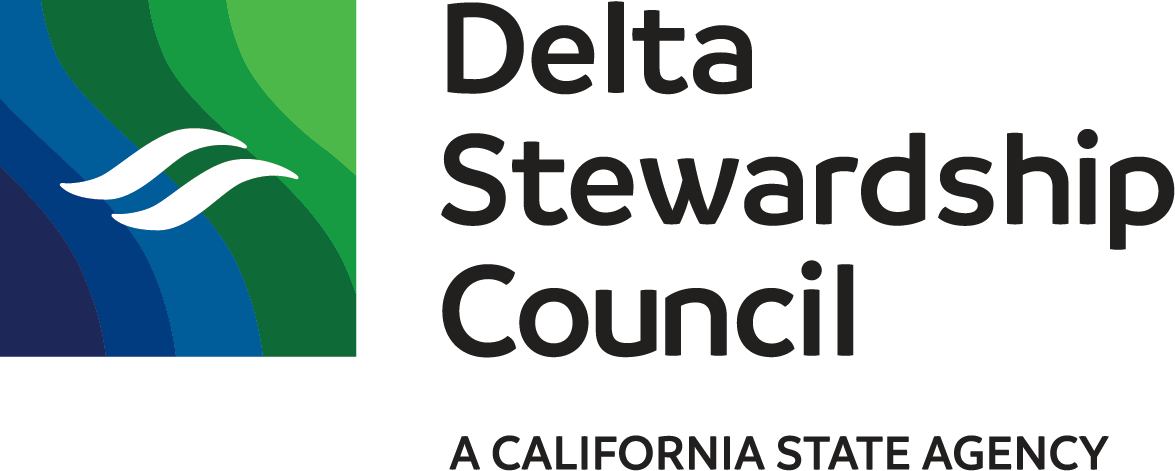
Big Milestone for Delta Climate Adaptation Offers Exciting Pathways Forward - And It Needs Your Input
December 20, 2024
By Morgan Chow, Dane Wicker, and Annika Ragsdale
The Sacramento-San Joaquin Delta is of critical importance to all of California’s people, ecosystems, and economy. It is an ancestral homeland and a place of cultural significance to many tribes, a crucial source of drinking water for 27 million Californians, a biodiversity hot spot for more than 750 plant and animal species, and an unmatched producer of crops, generating $4.5 billion in economic output each year. But like the rest of the state (and the world at large), this incredible place faces the accelerating impacts of climate change. Rising seas, extreme heat, flooding, drought, and changes in precipitation all threaten the residents, ecology, industry, agriculture, infrastructure, and economy of the region. At the Delta Stewardship Council, addressing these climate impacts is critical to our mission.
Enter: Delta Adapts: Creating a Climate-Resilient Future. A two-part initiative of the Council, Delta Adapts has been in progress since 2018 to help us better understand the Delta's specific climate risks and propose tangible strategies to prepare for them. The first part of this initiative - the Vulnerability Assessment - has been completed, and its findings were used to inform a critical milestone for the Delta and Suisun Marsh: the first-ever comprehensive regional climate adaptation plan for this region. The draft Adaptation Plan shows how far we’ve come and highlights the wealth of knowledge gained not only from rigorous scientific and technical analyses but also from engagement with a diverse range of interests who all rely on and care for the Delta. The result is a framework for making these much-needed climate adaptation efforts happen in the region.

Figure 1: Summary of Vulnerability Assessment findings, partner input during development of the draft Adaptation Plan, and key contents of the draft Adaptation Plan
Adaptation Strategy Examples
- Raise awareness of the importance and availability of community and household flood insurance as a component of flood resilience and long-term recovery from flood events.
- Emphasize the importance of working with and learning from tribes as restoration practitioners accomplish ecosystem restoration and stewardship.
- Support the long-term sustainability of agriculture by diversifying farmer income and revenue and bolstering their ability to adopt climate-smart farming practices.
- Protect water quality through salinity barriers or sills, and upstream actions like mountain meadow restoration.
A Menu of Strategies
The draft Adaptation Plan proposes a suite of strategies under four focus areas: flood risk reduction, ecosystem, agriculture, and water supply reliability, developed through collaboration with State agency peers, community-based organizations (CBOs), environmental justice advocates, and tribes and tribal serving organizations. The proposed strategies build and expand on priorities already established by the Delta Plan, which lays the policy foundation for this adaptation work. Under each focus area, the draft Adaptation Plan summarizes the identified needs, partnerships, and leaders required to realize these ambitious strategies, recognizing that the Council cannot do it alone. This holds especially true considering that no one region of the Delta or Suisun Marsh is the same as any other - each has its own unique challenges, considerations, and priorities. For this reason, the draft plan highlights appropriate adaptation strategies devised to match local challenges, such as salinity management in the Suisun Marsh and South Delta, the need to halt and reverse land subsidence in the Central Delta, and the opportunity to integrate farming practices with multi-benefit restoration projects in the North Delta. See this information sheet for a summary of the draft Adaptation Plan adaptation strategies.
A Climate Adaptation Plan for All
When considering the recommendation and prioritization of those strategies, the Council puts equity front and center. Collaboration on the draft Adaptation Plan began in 2021 with workshops in the cities of Stockton and West Sacramento, where we forged relationships with CBOs that helped us begin to understand the diversity of climate impacts residents face. These partnerships have expanded to CBOs that serve other communities and ultimately led to the formation of an Environmental Justice Expert Group, which informed the development of equity considerations for each of the proposed strategies in the draft Adaptation Plan as well as the Council’s Tribal and Environmental Justice Issue Paper. We also heard from farmers and growers, community members, and tribal members to learn first-hand about their challenges, how they are already adapting to climate change, and what more we can do. This outreach prioritized amplifying the voices of those historically left out of Delta planning.

Figure 2: Between fall 2023 and fall 2024, Council staff attended and presented at more than 20 community events and meetings to talk directly with community members about climate change and environmental justice issues and their priorities for addressing these challenges.
Where’s the Money?
Taking these strategies off paper and putting them into practice costs money. And though this upfront investment may be daunting, results from the Vulnerability Assessment are clear - doing this adaptation work is more cost-effective than not investing at all, as the value of lost assets is much higher. For instance, our vulnerability assessment found that if no improvements were made to levees, we risk the loss of over $10 billion in agriculture, commercial businesses, and people’s homes in the case of a 100-year flood event. The draft Adaptation Plan identifies a need to develop an innovative, coordinated funding strategy to implement these adaptation actions.
This Work is Important - And We Need You
As the convener of Delta Adapts, the Council intends to bring partners together to coordinate efforts, align visions, and outline common pathways to advance the strategies set forth in this Adaptation Plan. We would like to incorporate local priorities in this regional plan, as well as highlight progress made by and additional needs for tribal, local, regional, state, and federal partners. And we want to hear from you!

The Council has released its draft Delta Adapts: Climate Adaptation Plan for public comment and tribal consultation. For more information on this effort, visit deltacouncil.ca.gov/delta-plan/climate-change. Please email questions and public comments to us by January 17, 2025, directed to climatechange@deltacouncil.ca.gov. Public comments may also be mailed to:
Delta Stewardship Council
ATTN: Morgan Chow
715 P Street, 15-300
Sacramento, CA 95814
Also, you’re invited to join our hybrid drop-in workshop!
Share your thoughts and ask questions about the Delta Adapts Draft Adaptation Plan. Comments and ideas heard at this hybrid discussion will be considered along with written public comments submitted via email or mail.
When: January 6, 2025; join anytime between 4:00-6:00 PM.
Where: In-person at 715 P Street, Sacramento, CA, room 221C, or participate virtually on Zoom. For planning purposes, we encourage all attendees (in-person and virtual) to register for the event and answer the optional questions on Zoom.
Tribal consultation requests were sent to tribes via U.S. mail and email. If a tribe is interested in consulting with the Council on the draft Adaptation Plan, it is encouraged to email the Council’s tribal liaison at tribal.liaison@deltacouncil.ca.gov for more information.
Please note that the public comment period for the draft Adaptation Plan and supporting documentation has been extended and will conclude on February 18, 2025. Comments may be sent to the email and mailing address provided above.

